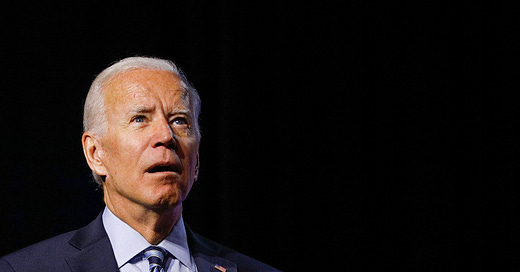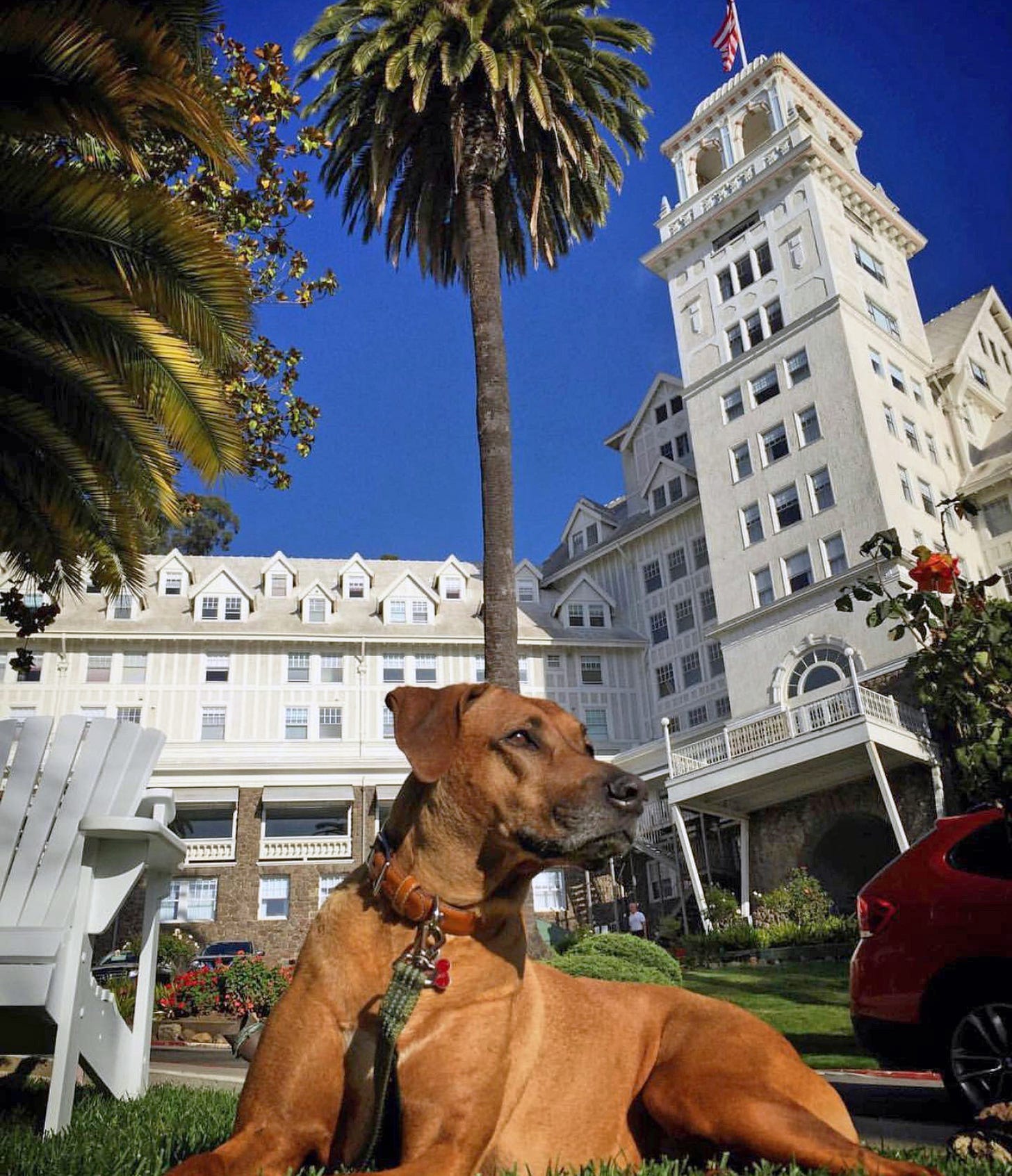The Man Who Brought Us Here
How Joe Biden's pride, insularity, and stubbornness led us into this nightmare.
By April of last year, the health of the president had clearly declined. As with many older men in their eighties, this didn’t happen in a slow, predictable glide-path down — but in swift, turbulent declines. Suddenly he took a while to get out of his limo, and then would emerge “with a blank look in his face,” according to the new campaign book, Fight, by Jonathan Allen and Amie Parnes. By early summer, Biden was suddenly freezing up in public, staring motionless into the air. At a fundraiser in Los Angeles, Obama had to jump in to answer some questions, and then had to guide Biden off the stage by hand. We had already seen Joe wander weirdly off the set of MSNBC and during a Medal of Honor ceremony. His memory lapses mounted.
Everyone around him saw this. Everyone close to him had seen it for over a year by then. Everyone in his campaign knew that upwards of 86 percent of Americans thought he was too old to serve another term. And no one did anything about it.
Sometimes human folly is just human folly. Sometimes, even at the pinnacle of the world, you find flawed people struggling with familiar human problems, like how to tell a beloved but fast-aging man that he needs to leave the stage before he falls off it. Just because she was First Lady did not prevent Jill Biden from putting family before country; and just because he was president didn’t mean that Biden reacted to his own decline with denial, anger, pig-headedness, and arrogance.
Do we learn anything new in this book and another one, Uncharted, by Chris Whipple out next week? Not really. We know, in fact, that everything I guessed happened did actually happen. Among the unsurprising confirmations: Obama was so aloof he didn’t even watch the fateful June debate live; he and Pelosi then wanted an open primary and did all they could to get one. (“He goes. She goes” was their mantra.) Hillary Clinton defended Biden — not because she knew his health was fine, but because her health had once been questioned by the press too. Biden’s closest advisers were his wife and, yes, his son Hunter, and they routinely put their clan’s interests well before the country’s. His inner circle — Mike Donilon especially — were so blindly loyal and informationally siloed they couldn’t absorb what was staring them in the face.
The Democrats, even as late as July, could have found a fresh candidate capable of taking on what they said was a vital moment for democracy’s survival. We might have avoided our current abyss:
“It would have been very cheap. It would have been quick. A rocket ship for your career and no loss,” said one Democratic former governor. “If this had been a year earlier, twenty people would have gotten in,” said one governor who had kicked the tires on a 2024 bid.
Why didn’t they? That is a question that will reverberate through history. Wokeness was a factor. The only reason the embarrassingly mid Harris was made veep in the first place was to fill a slot Biden had already marked for a woman, and, in the wake of the Floyd murder, a black woman seemed the only option. Everyone, particularly Pelosi and Obama, knew Harris was a disaster about to happen, and her vice-presidency had the lowest approval ratings in history. Obama told friends directly that he thought she couldn’t win. The night after the epic debate, Pelosi gritted her teeth: “Oh my God. It’s going to be her.”
So yes, identity before merit was a principle the Dems clung to even at the expense of marching off an electoral cliff. “If you want to break the Democratic coalition, try to skip over the first African-American vice president,” Michigan Senator Elissa Slotkin argued at one point. “I watched the black-white stuff start on Thursday night [after the debate],” said another lawmaker. Donna Brazile assembled a team of black women operatives who called themselves “the colored girls” to ensure Harris became the nominee. Jim Clyburn was also a critical supporter: “I’m going all in with Kamala. I don’t want to look back and y’all ain’t there,” he told the DNC.
The open primary therefore never happened. Harris became the nominee for one core reason in the end. Biden, who had previously used the awfulness of Kamala as a way to dissuade anyone from pushing him out, decided to endorse her after she pleaded with him the day he decided to quit. One source “close to both men” explained: “It was a fuck-you to Obama’s plan. At that moment, you have very few things you control, and that’s one thing he had control over, and he chose to stick it to Obama.” So much for putting the survival of democracy first.
And yes, they lied. Jill Biden was one of the worst offenders. She insisted in January 2024, “I see his vigor, I see his energy, I see his passion every single day. I say his age is an asset.” Before the June debate, Joe had been drained by grueling international travel, was catching a cold and couldn’t last more than 45 minutes in the practice debates. But the First Lady went out and told the world: “The president’s feeling great. He’s ready. We’re going to win this thing.” The woman who had covered up her husband’s decline for the previous two years now set expectations that were, of course, utterly ruinous.
Her own former press secretary said:
Cover-up to me is a little hard, a little harsh. Every politician, everybody, every human being tries to cover up age. We were always, from day one, cognizant that age was an issue … The president’s team was scared to death of impromptu, unscripted, un-rehearsed, unpracticed, un-choreographed, anything, they couldn’t compete for the attention economy. They just couldn’t do it.
What were they thinking? Their very actions were rooted in the understanding that Joe Biden couldn’t function as president any longer; and yet they kept insisting he could govern for four more years! This is the much-respected Ron Klain, spinning desperately to conceal his responsibility for Trump 2.0:
According to Klain, it turned out that Biden “didn’t know what Trump had been saying and couldn’t grasp what the back and forth was”; left preparation and fell asleep by the pool; obsessed about foreign leaders, saying “these guys say I’m doing a great job as president so I must be a great president”; “didn’t really understand what his argument was on inflation”; and “had nothing to say about a second term other than finish the job.”
But Klain was fully behind the president nonetheless. As the campaign reeled after the June debate, it took another month of wasted time to move forward, as Biden sequestered himself with his closest trio of Bruce Reed, Mike Donilon, and Steve Ricchetti, who kept the bubble sealed, tight, and pissed. Even at the time, many worried that Biden was in a cocoon, unaware of his own dismal polling. From Axios at the time:
“Too many of his top aides are his friends,” said one former Biden aide. Another former aide said the dynamic is less like friends and more like adult children, all vying for their father’s approval. “Mike Donilon needs to tell the president he is losing,” said a third former aide.
But Donilon didn’t. In fact, he still believes Biden should have stayed in the race and would have won. He vented in February:
I think the party lost its mind. If you ask people about this period of time, they’ll tell you Biden was losing the polls, he was going to lose. … They were saying this in a margin-of-error race … If you actually go and look at the polling in the first couple of days after the debate, the margin between Trump and Biden got closer. It didn’t get bigger.
That is the kind of blind loyalty that can kill a presidency. But this time, it killed a lot more than that: a chance to keep Trump from power. By his words, Joe Biden told us that was the most important thing. By his actions, Biden told us that his own vanity was more important. By their actions, Donilon, Reed, Klain, Jennifer O’Malley Dillon, and Dr Jill told us the same. The Democratic Party has a strange habit of never holding the architects of electoral failures accountable. That should end after this.
But in the end, the story of 2024 is painfully, excruciatingly human. Biden’s prickly pride and long-nurtured insecurity, the insularity of his too-loyal circle, and the entitlement that comes from decades of public life at the top all led to collective tragedy. We are now living in the wake of this man’s fallibility and stubbornness. It’s a story we all know well in our private capacities: the tale of trying to get grandpa to give up his car keys before he drives into a ditch and hurts someone.
Well, welcome to the ditch. And the casualties are mounting.
(Note to readers: This is an excerpt of The Weekly Dish. If you’re already a paid subscriber, click here to read the full version. This week’s issue also includes: a spirited debate with Douglas Murray over deportations and Israel; dissents over the Nick Denton pod with many replies from Nick; reader dissents over my latest Trump piece; 15 notable quotes from the insane week in news, including three Yglesias Awards; 21 pieces on Substack on a variety of topics; a Mental Health Break from Matt and Trey; a fecund view from Hawaii; and, of course, the results of the View From Your Window contest — with a new challenge. Subscribe for the full Dish experience!)
From a newcomer to the Dish:
I subscribed for research purposes. I’m writing a book about the rise of the post-liberal right. I am not a conservative, but I do have great respect for the Dish and appreciate the ways in which you have elevated the discussion around conservative ideas and politics.
From a new subscriber who gave a little extra:
I appreciate your ability to steelman the arguments of people you disagree with, while still holding your own values and commitments strongly. Very few commentators are doing that these days. Keep it up!
Back On The Dishcast: Douglas Murray
Douglas is a writer and commentator. He’s an associate editor at The Spectator and a columnist for both the New York Post and The Sun, as well as a senior fellow at the Manhattan Institute. His books include The Madness of Crowds and The War on the West, which we discussed on the Dishcast three years ago. His new book is On Democracies and Death Cults: Israel and the Future of Civilization. We had a lively, sometimes contentious session — first on Trump, then on Israel’s tactics in Gaza.
This episode and a forthcoming one with Francis Collins were challenges. How to push back against someone who is your guest? I never wanted the Dishcast to be an interrogation, an Andrew Neil-style interview. But I also wanted it to air debate, so I try to play devil’s advocate when appropriate. I’m sure you’ll let me know how I’m doing after this one.
Listen to the episode here. There you can find two clips of our convo — on Palestinians “endlessly rejecting peace,” and debating the Khalil case. That link also takes you to a bunch of commentary on Nick Denton’s appraisal of China’s dominance, along with many responses from Nick.
Browse the Dishcast archive for an episode you might enjoy (the first 102 are free in their entirety — subscribe to get everything else). Coming up: Claire Lehmann on the success of Quillette, Evan Wolfson on the history of marriage equality, Francis Collins on faith and science and Covid, Stephen Macedo and Frances Lee on Covid’s political fallout, and Paul Elie on his book The Last Supper: Art, Faith, Sex, and Controversy in the 1980s. Please send any guest recs, dissents, and other comments to dish@andrewsullivan.com.
Dissent Of The Week
A reader thinks my rhetoric was too heated in my column on Trump’s “two perfect months”:
Do you think you could tone down on your use of “fascism”, which seems to be proliferating? My point is not to diminish the alarming aspects of the current administration. My point is the opposite: so much of our political discourse has devolved into name-calling.
Has anyone ever become more skeptical of Israel’s behavior toward Palestinians when they heard protesters screaming in the street about “genocide” and “apartheid”? Has anyone ever been persuaded when they heard activists assert that X (controversial politician or state) equals Y (recognizably terrible politician or state)?
Intensity of vocabulary doesn’t replace soundness of arguments. The NYT had a terrific piece about how the word “genocide” is a moral (I’m tempted to say perlocutionary) term, not a descriptive one. It’s invoked to stir action, not to depict reality. And the generalized use of the word “fascism” since the 1940s to attack any perceived excess in power has voided it of all power, except to discredit the person who employs it. Can we keep the focus on substance, not labels?
In my defense, I used the f-word twice in the column — and both were qualified. I described those who hold due process in contempt as “wannabe fascists.” And I said that posing in front of a jail packed with near-naked prisoners was “fascistic”. I agree the term can confuse as much as enlighten. But grabbing people off the streets with no due process and exulting in others’ misery definitely have f-vibes.
As always, please keep the dissents coming: dish@andrewsullivan.com. And follow more Dish debate in my Notes feed.
In The ‘Stacks
This is a feature in the paid version of the Dish spotlighting about 20 of our favorite pieces from other Substackers every week. This week’s selection covers subjects such as the tariff madness, how the Dems might prevail, and shrooms for anorexics. Some examples:
Three cheers for the Free Press: “No Deportations Without Due Process.”
A paean to Pamela Paul. Come to Substack!
Bugger off, Bloomberg.
Substack is partnering with FIRE to legally defend writers in America who aren’t US citizens. The Dish has never been prouder of this platform.
Here’s a list of the substacks we recommend in general — call it a blogroll. If you have any suggestions for “In the ‘Stacks,” especially ones from emerging writers, please let us know: dish@andrewsullivan.com.
The View From Your Window Contest
Where do you think it’s located? Email your guess to contest@andrewsullivan.com. Please put the location — city and/or state first, then country — in the subject line. Proximity counts if no one gets the exact spot. Bonus points for fun facts and stories. The deadline for entries is Wednesday night at midnight (PST). The winner gets the choice of a VFYW book or two annual Dish subscriptions. If you are not a subscriber, please indicate that status in your entry and we will give you a free month sub if we select your entry for the contest results (example here if you’re new to the VFYW). Contest archive is here. Happy sleuthing!
The results for this week’s window are coming in a separate email to paid subscribers later today. From last week’s contest, a fellow dog-lover:
I don’t have time to find the actual window, but this could be the best photo of a VFYW location I’ve ever seen:
Our canine friend is probably looking at a similar view as our window photo!
Another sleuth remembered that hotel:
I went to high school in the East Bay and our prom was at the Claremont Hotel (class of 1982). It was, and remains to this day, a wonderful embodiment of what makes Berkeley and the surrounding Oakland Hills so unique: regal, elegant, but also somehow bohemian. The very definition of shabby chic.
Another wrote:
Despite the Claremont Hotel being such a landmark of my childhood, I’ve actually only set foot in it a handful of times. Mom and I went to the spa a couple of times back in the ‘90s, but most importantly, Andy’s and my second wedding reception was at the Claremont in 1998, about five floors below this window.
Another loving memory:
I’ve set foot inside that lovely old place only once: on my wedding day, when my bride and I rented Room 409, the honeymoon suite, after we tied the knot and before we flew off for a Hawaiian honeymoon. Did I say romantic? It’s romantic.
We were exhausted and drunk and mistakenly left the rest of our wedding cake in the minibar. But what were we going to do, stuff it in a carry-on? The room did come with a bottle of Dom Perignon (again, my first and so far only time), which we saved and opened at a beachfront restaurant in Kauai and felt very royal. We felt the ghost of Elvis amid the blazing torches of the not-far-away Royal Hawaiian.
See you next Friday.







